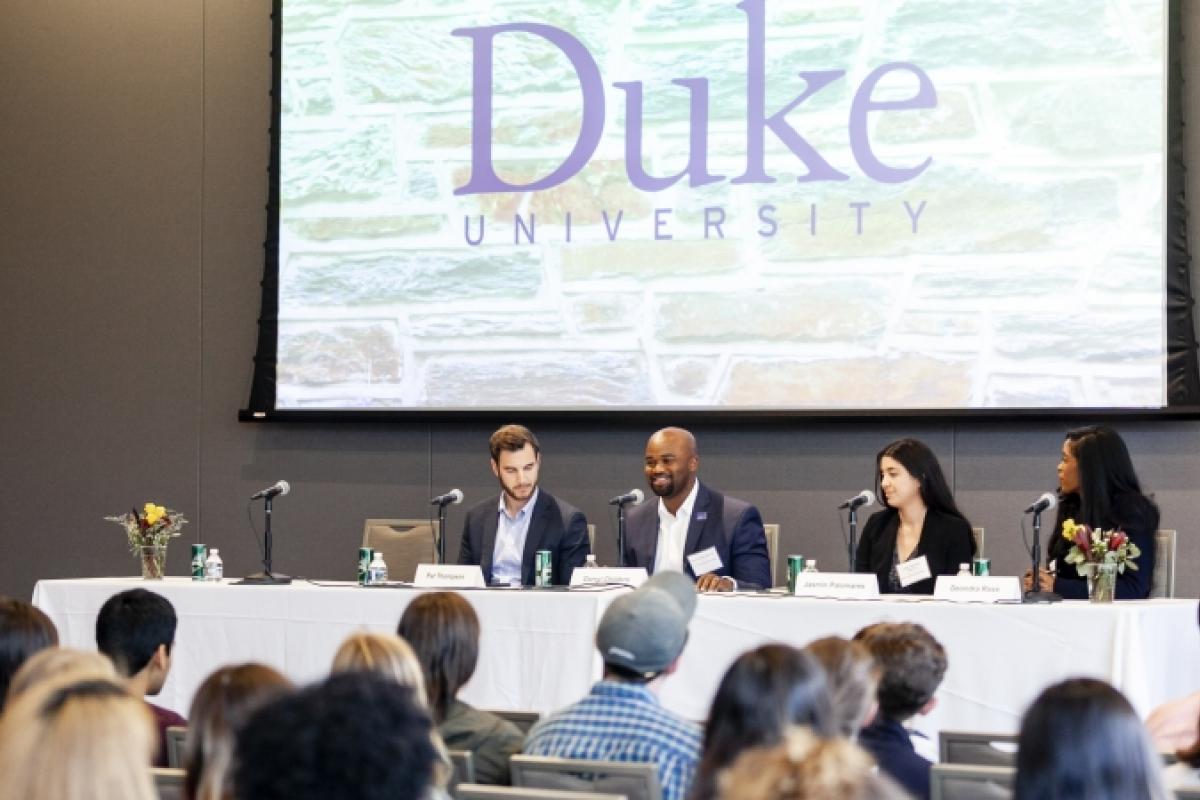On a beautiful fall afternoon in November, 187 Duke students showed up to hear 10 alumni talk about careers in public service and how they got there.
The event, Careers for Good, was the highlight of the semester for the EMBARK program, a student led initiative which seeks to provide networking and career strategies for students interested in policy, advocacy and politics-related professions. The Sanford School of Public Policy’s career services office launched EMBARK in 2015.
Career advisor Suzanne Valdivia, who manages the Embark program out of the Sanford Career Services office, was delighted with the turnout.
“In conversations with students, I have gotten the sense that many of them would choose a job that makes a positive social impact, even if the pay is somewhat lower, over a job that doesn’t have that impact,” she said.
About EMBARK
The Careers for Good sign event was held in Penn Pavilion. Alumni panelists talked about how they found their jobs that focus on public service. The event was run by Sanford's EMBARK program. Embark is open to all Duke students, even those who are not majoring in public policy. The Embark team includes Sanford Assistant Internship Director Suzanne Valdivia and Sandra Martinez Zuniga, assistant director at the Duke Career Center.
“But they need to see what those options are and they are pretty swamped just keeping up with the demands of being engaged, on-the-ball Duke students. So it’s up to programs like Embark to highlight those examples.”
Provost Sally Kornbluth gave the welcome, reassuring students that there was “no rush to find the perfect job the minute you graduate.” Kornbluth also affirmed the choice of a public service career.
“It’s not hard to see every day in the headlines the importance of having well-prepared and well-educated individuals addressing current issues,” she said.
There were three panels of alumni: one on positions with political officials; one on private sector jobs with public service aspects, such as social impact investing; and a third focused on human rights and international development. The Embark student team, which includes Spencer Bandeen, Claire Gibbs, Molly Paley, Riley Pfaff and Akanksha Ray, played key roles in planning, marketing, and hosting the event, including introducing panelists and working behind the scenes the day of the event.
Afterward, students mingled with the panelists and talked with representatives of several service-year organizations, including Teach for America, Lead for America, the Peace Corps and College Advising Corps. Highlights of the alumni tips follow.
Networking and Memo Writing
All of the alumni emphasized the importance of networking, not only for finding that first job, but for the next job or the next interesting assignment or project.
“It cannot be stated enough times. I know you are sick of hearing it,” said Jackson Tufts MPP’19 on the importance of networking. Tufts works at Booz Allen Hamilton and prior to graduate school was a staffer on the Hill for 8 years. He acknowledged that for some people networking isn’t easy.
“It took me three years to get comfortable with it,” he said.
“It doesn’t have to be a big dramatic thing,” said Ciara Coughlin MPP’16, now with USAID. She didn’t understand as an undergraduate that networking could just be a conversation.
Megha Bansal MPP’12, with Monitor Deloitte, agreed.
“Don’t think you have to know everything about what you’re looking for. Some of these conversations are just to open up what is out there for you,” she said.
Panelists also stressed that good writing is a valuable job skill, no matter what field. Students should take advantage of the resources at Duke to develop that skill, such as professors and the tutors at the writing center. Tufts called it “the biggest, best skill you can have.”
Bouncing Back
“Everyone who has applied for jobs has been rejected,” said Emily McKelvey PPS’13, now with Social Finance Inc.
“The recruiting process is lunacy once you see it from the other side,” she said, describing her experience in coming back to campus to recruit for her company. She reviewed 100 resumes, as did several other people, then human resources picked 15 for interviews.
Coughlin thought she wanted to join the Foreign Service, which has a notoriously difficult entrance exam. When she failed it on her first try, she had no backup plan. She went back to mentors from her internship in the State Department, who recommended she join the Peace Corps to get relevant experience.
“It changed the trajectory of my career,” she said. Coughlin now works in international development instead of diplomacy.
Pat Thompson PPS’11/MA’13 now works on Capitol Hill for Sen. Roger Wicker (R-Miss). He was turned down for a job as legislative director with a senator from Alabama, but asked that they keep him in mind. He later got a call from the office of Rep. Rob Wittman (R-Va.), where he worked for three years.
“Even though you’re a Duke grad, it doesn’t make you impervious to failure. We all fail,” he said. It’s important to be persistent, he said.
Mentoring and Giving Back
“I found a lot of mentors here at Sanford. The job I have now I found through Jenni Owen, who was a professor at Sanford,” said Darryl Childers MPP’14 of the office of N.C. Gov. Roy Cooper.
Thompson worked with the basketball team at Duke and counts Coach K among his mentors, and pointed to the basketball idea of “the next play.” He said it was important not to rest on your laurels but keep thinking about the next job.
The alumni panelists said they were glad to come back to campus.
“It is extremely important to share our experiences because a job or opportunity may seem out of reach until you see someone in that role who looks like you,” said Jasmin Palomares PPS’17, of the office of U.S. Sen. Kirsten Gillibrand (D-N.Y.).





